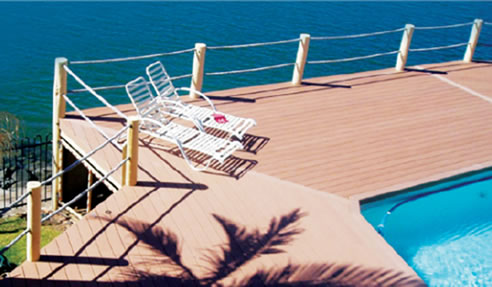Adapting to Australia's Environment with Composite Decking

It all started in the USA, the home of the brave and the land of the free gift with purchase. US contractors and builders often used softwood timber lumbers susceptible to mould and rotting. This occurrence served as a driving force in developing a timber alternative that resembled the natural beauty of timber.
The use of hardwood for garden furniture and decking isn't entirely new in the Australian setting. Since these features are mostly outdoor structures, they must be able to withstand the harsh elements. Wind, sand, humidity, intense heat and UV rays from the sun will definitely wear out even the most expensive hardwood.
Futurewood to the rescue!
Futurewood's CleverDeck composite decking addresses all the issues involving natural timber, Australia's environment, termite attacks, and mould and mildew. Futurewood provides a solid composite wood that is made up of combined cellulose material (wood flour and rice husks) and recycled industrial waste (polyethylene). The primary components in CleverDeck composite decking is combined with colour pigments, UV inhibitors, anti-mould agents. Moisture resistance and fillers are added to ensure the strength of composite timber. The composite decking is then tested for strength and stability and the end product is weatherproof, eco-friendly and low in maintenance!
CleverDeck's components make it highly adaptive to Australia's diverse environment!

Futurewood's composite decking has a low moisture absorption rate and is resistant to the effects brought about by the sea - coastal wind and salt water. For this reason alone, composite decking is ideal to use for coastal properties, wellness spas, pool decking projects or wharfs.
Composite timber contains high resistance to humidity, the less likely for moisture to seep in, making the composite decking immune to termite attacks. Australia has a lot of white ants and termites, especially in the northern tropical parts of Australia. Subterranean termites dwell on the ground and require contact with moisture and soil. These are the types of termite that pose a threat to timber in the built environment - but not to a solid composite decking like CleverDeck.
Composite decking is designed and manufactured not to buckle over prolonged exposure to elements. Natural timber will rot, splinter, bend, twist or warp. In the long run, dilapidated wood decking may expose nails or fasteners that can hurt pedestrians or a sagging deck board can cause someone to fall through its joists. A CleverDeck upholds the safety of its users. Unlike natural timber, composite decking is slip resistant and splinter free.
Timber is known for its aesthetic appeal but not for long. Foot traffic, change of season, erratic weather, a riverine or coastal location will eventually take its toll on the wood. Unless you have all the means and resources to have it regularly lacquered and polished to perfection! Composite decking is made from a process that results in consistency and is virtually maintenance free with a prolonged life set against Australia's harsh climatic environment.
Taking these factors into consideration, plus a 10-year warranty against rotting and termite damage - now imagine the benefits that you can enjoy by using CleverDeck, Futurewood's clever composite decking system.
Futurewood is an advocate of green living and sustainably built environments. By providing clients a wide range of eco-friendly composite wood products, Australian timbers are spared and left in the rainforests where they belong.
Contact Futurewood today for more details on CleverDeck and other sustainable timber alternatives!

|





 Slip-Resistant Walkways for Theme Parks
Slip-Resistant Walkways for Theme Parks Low Maintenance Cladding for Water Park
Low Maintenance Cladding for Water Park Facade Screening for Industrial
Facade Screening for Industrial Care Tips for Composite Timber Decking
Care Tips for Composite Timber Decking Composite Timber for Picnic Tables by
Composite Timber for Picnic Tables by Three Types of Decking by Futurewood
Three Types of Decking by Futurewood Weatherproof Cladding Supplier by
Weatherproof Cladding Supplier by Composite Timber Fences for Backyards by
Composite Timber Fences for Backyards by Composite Decking Frame by Futurewood
Composite Decking Frame by Futurewood Composite Decking Supplier NSW by
Composite Decking Supplier NSW by Composite Timber for Outdoor Benches by
Composite Timber for Outdoor Benches by Vertical Screening for Backyard by
Vertical Screening for Backyard by Weatherproof Composite Cladding for
Weatherproof Composite Cladding for Maintenance Free Decking by Futurewood
Maintenance Free Decking by Futurewood Timber Alternative Features by
Timber Alternative Features by Aluminium Subframe for Decks by
Aluminium Subframe for Decks by Advantages of EnviroSlat Screening
Advantages of EnviroSlat Screening Composite Timber Screen Fencing by
Composite Timber Screen Fencing by External Weatherproof Cladding by
External Weatherproof Cladding by Ultralow Aluminium Joist and Pedestal
Ultralow Aluminium Joist and Pedestal
